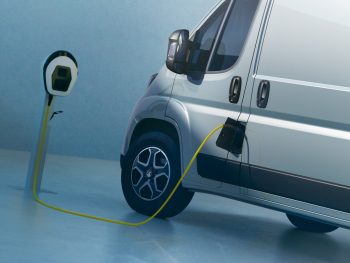Rising electric van demand saw the 60,000th eLCV join UK roads in January, new figures from the Society of Motor Manufacturers and Traders (SMMT) reveal.

The van registration data for January shows demand for new battery electric vehicles (BEVs) grew to 1,186 units in January, up 19.4% on the same month last year. As a result, some 60,517 new BEVs have joined Britain’s roads since 2018, supported by access to the Plug-in Van Grant and the availability of 28 different BEV models.
The 19.4% rise in electric van registrations actually outpaced the overall new van market, which saw volumes rise 8.4% to 23,962 units. The increase across the sector marks 13 consecutive months of growth and the highest January total since 2021.
Growth was most pronounced for medium-sized vans, up by almost two-thirds (60.9%) to 5,040 units, representing 21.0% of the whole market.
Registrations of the largest vans (over 2.5 tonnes and up to 3.5 tonnes) fell by 4.5% to 14,839 vehicles – but these continued to be the most popular, still representing more than six in 10 (61.9%) of all new vans.
Pickup and 4×4 uptake also increased, up 18.2% and 62.4% to 3,002 and 729 vehicles respectively, while registrations of the smallest vans dropped by a fifth (19.8%) to just 352 units.
The SMMT said the 13 months of growth for new van registrations showed the importance of the van sector.
It added that passing the 60,000 electric van milestone was a crucial step in the net zero journey.
But the industry body said green uptake must grow faster, as the ZEV mandate requires BEVs to represent 10% of sales in 2024; in January’s registrations, BEVs accounted for 4.9%.
The current industry outlook is for volumes to grow from 5.9% of the market in 2023 to 9.4% across 2024 – slightly short of the 10% target mandated by the Government.
While the Vehicle Emissions Trading Scheme does have inherent flexibilities that will enable manufacturers to offset this initial shortfall, softening demand underlines the need for greater investment in public charging infrastructure for vans of all sizes, which remains the biggest barrier to faster BEV rollout.
The current level of demand also shows that the Plug-in Van Grant must remain in place to encourage operators of all types to switch to the very latest technology. The scheme has currently only been confirmed as available until 31 March 2025, although the Government recently said it recognises the challenges for van decarbonisation and provided assurances that further solutions are under development to support fleets.
Mike Hawes, SMMT chief executive, said a range of support mechanisms are needed to ensure business confidence in making the move to EVs.
“Industry is ready to deliver a mass market transition but buyer demand must increase massively, requiring everyone to play their part. Ramping up dedicated public van charging infrastructure in particular is essential for all UK businesses to be confident of making the switch, sooner rather than later,” he stated.

